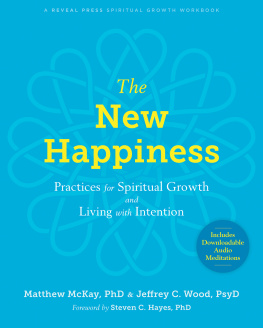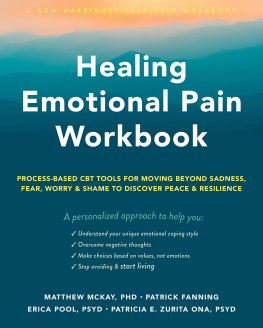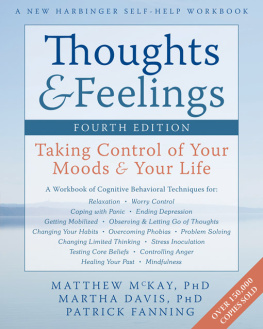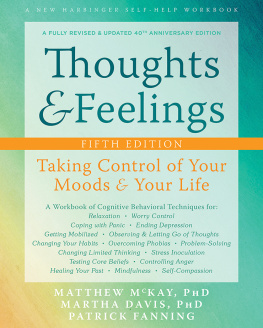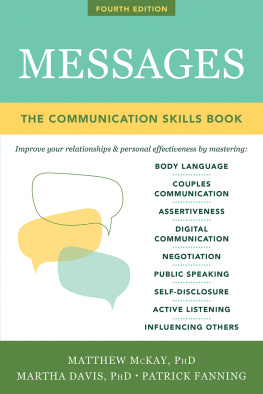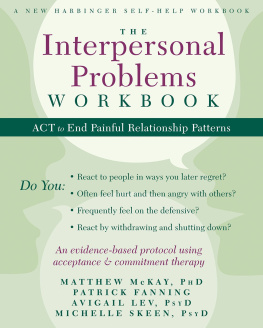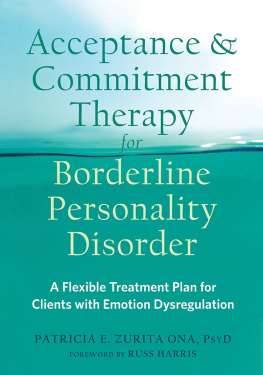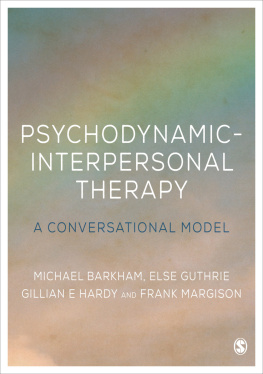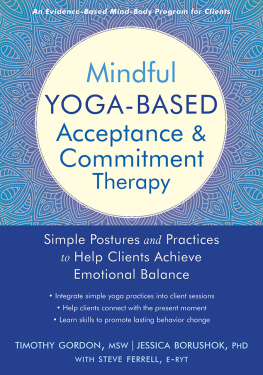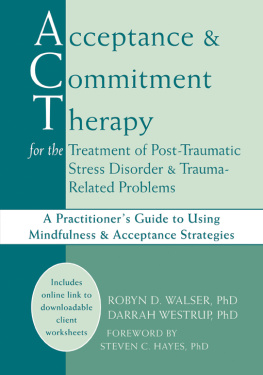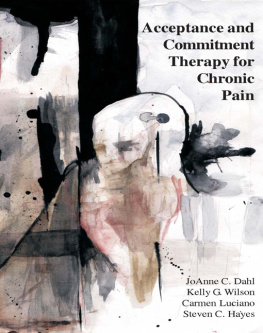
Matthew McKay, PhD, is professor at the Wright Institute in Berkeley, CA. In private practice, he specializes in the treatment of anxiety, interpersonal problems, and depression. He is coauthor of The Relaxation and Stress Reduction Workbook, Thoughts and Feelings, Self-Esteem, Your Life on Purpose, and many other titles. Combined, his books have sold more than three million copies.
Avigail Lev, PsyD, is clinical supervisor at the Berkeley Cognitive and Behavioral Therapies Clinic. She specializes in couples therapy and treating mood disorders and interpersonal problems.
Michelle Skeen, PsyD, studied schema therapy under Jeffrey Young. She completed her postdoctoral work at the University of California, San Francisco, and maintains a private practice in San Francisco, CA, where she lives and works. She hosts a radio show and is author of The Critical Partner. www.michelleskeen.com
Foreword writer Steven C. Hayes, PhD, is University of Nevada Foundation Professor of Psychology at the University of Nevada, Reno. He is author of hundreds of scientific articles and many books, including Acceptance and Commitment Therapy, Relational Frame Theory, and Get Out of Your Mind and Into Your Life.
This intensely practical book offers a cutting-edge evidence-based framework for mental health professionals seeking to more effectively address the myriad interpersonal problems that individuals seeking psychotherapy face in their daily lives. It is the first book of its type to bridge the more cognitive notions of schemas with newer mindfulness and acceptance-based behavior therapies such as acceptance and commitment therapy. The authors know both worlds intimately, and offer a straightforward approach that gets to the heart of patterns of unhelpful interpersonal behavior that ultimately damage significant social bonds. The book is full of practical exercises, worksheets, and even a full-length protocol outlining its use in either an individual or group therapy format. This book is a must-read for any mental health practitioner who takes seriously the significant social and interpersonal problems faced by those they serve.
John P. Forsyth, PhD, professor of psychology at University at Albany, SUNY, and director of its anxiety disorders research program
Acceptance and Commitment Therapy for Interpersonal Problems is a user-friendly guide to helping your clients employ ACT to manage the pain and suffering caused by unhelpful schemas that contribute to the relationship distress that often accompanies the personal disorders they bring to their sessions with you. This book will guide you through a step-by-step process for helping your clients accept schema-related pain in the service of values-based interpersonal behavior. Highly recommended.
Richard Blonna, EdD, author of Stress Less, Live More
Interpersonal difficulties are a common focus of clinical work, either as a primary presenting problem or one that further complicates other issues that clients bring with them to therapy. This book skillfully integrates schema theory with acceptance and commitment therapy. Matthew McKay, Avigail Lev, and Michelle Skeen guide the reader through a systematic program emphasizing mindfulness and compassionate acceptance of thoughts, feelings, and urges that typically result in interpersonal difficulties, along with the clarification of personal values to inform alternative ways of relating to others. Numerous handouts and forms throughout, as well as an appendix with a session-by-session protocol, provide an easy-to-follow set of empirically-supported guidelines. This book should be a welcome addition to the library of all mental health professionals who struggle in working with clients who find their relationships with loved ones, friends, and coworkers more often a source of psychological pain than fulfillment.
Robert D. Zettle, PhD, professor of psychology at Wichita State University and the author of ACT for Depression
Mental health professionals interested in new horizons in evidence-based treatments will find this book to be a valuable first step in the direction of integrating acceptance and commitment therapy into their work. This book offers a unique journey through the ACT material by integrating the vernacular of traditional cognitive behavior therapy. The authors dare ACT therapists to broaden the scope of their conceptualizations while challenging CBT therapists to apply mindfulness and acceptance to their toolbox of interventions.
D.J. Moran, PhD, BCBA-D, founder of Pickslyde Consulting and the MidAmerican Psychological Institute
While chronic interpersonal problems are often the most difficult to address clinically, this book provides new hope for the clinician. It is simple, practical, sound, and evidence-based.
Kirk Strosahl, PhD, co-founder of acceptance and commitment therapy and coauthor of The Mindfulness and Acceptance Workbook for Depression and Brief Interventions for Radical Change
Over the years, different therapy approaches have attempted to help clients struggling with interpersonal problems. Despite showing some benefits, none of these approaches made a significant difference in these clients lives. Finally, ACT for Interpersonal Disorders offers readers an alternative that is not only innovative, but also based in research. This book sets a gold standard for how to integrate ACT and schema therapy and shows us step by step how to make real changes in the lives of clients struggling with their relationship to their own pain and relationships with the people they care about.
Patricia Zurita Ona, PsyD, clinical supervisor at the Berkeley Cognitive Behavioral Therapy Clinic and the Wright Institutes behavioral medicine training program
McKay, Lev, and Skeen present a successful, innovative combination of ACT and a schema-based approach to help clients with interpersonal relationship problems gain more behavioral flexibility and move beyond inflexible patterns of relating. Rather than changing dysfunctional schemas or core beliefs, the authors teach readers in clear, practical steps how to help clients alter the way they relate to their thoughts so that they can choose different responses based on their chosen values. The book is based on long-term clinical and research experience that shows how clients gain greater psychological flexibility through building acceptance and defusing from unhelpful thoughts, emotions, and beliefsincluding schemas. With its many worksheets and exercises, as well as a session-by-session treatment outline, this book is a great resource for any therapist who wants to help clients develop less conflict-filled, richer, and more fulfilling life.
Georg Eifert, PhD, professor emeritus of psychology at Chapman University
Relying on a storytelling clinical voice, the authors articulate an innovative approach to applying ACT technology to interpersonal problems using the language of schemas (e.g., abandonment, failure) as a heuristic to identify historic thoughts, feelings, and action urges that are sources of pain and unlikely to go away. The book describes a step-by-step treatment approach wherein the clients learn to recognize old moves to avoid the emotional pain associated with these schemas and discover how to stop these behaviors that create unnecessary interpersonal suffering. It includes clear descriptions of interventions, with samples of therapist-client dialogue and handouts to use with clients. The book is based on a small randomized controlled trial in a group setting and indeed, it includes that protocol in one of the appendices; however, the material presented in this book could easily be utilized in individual and couples therapy, as well.
Next page

